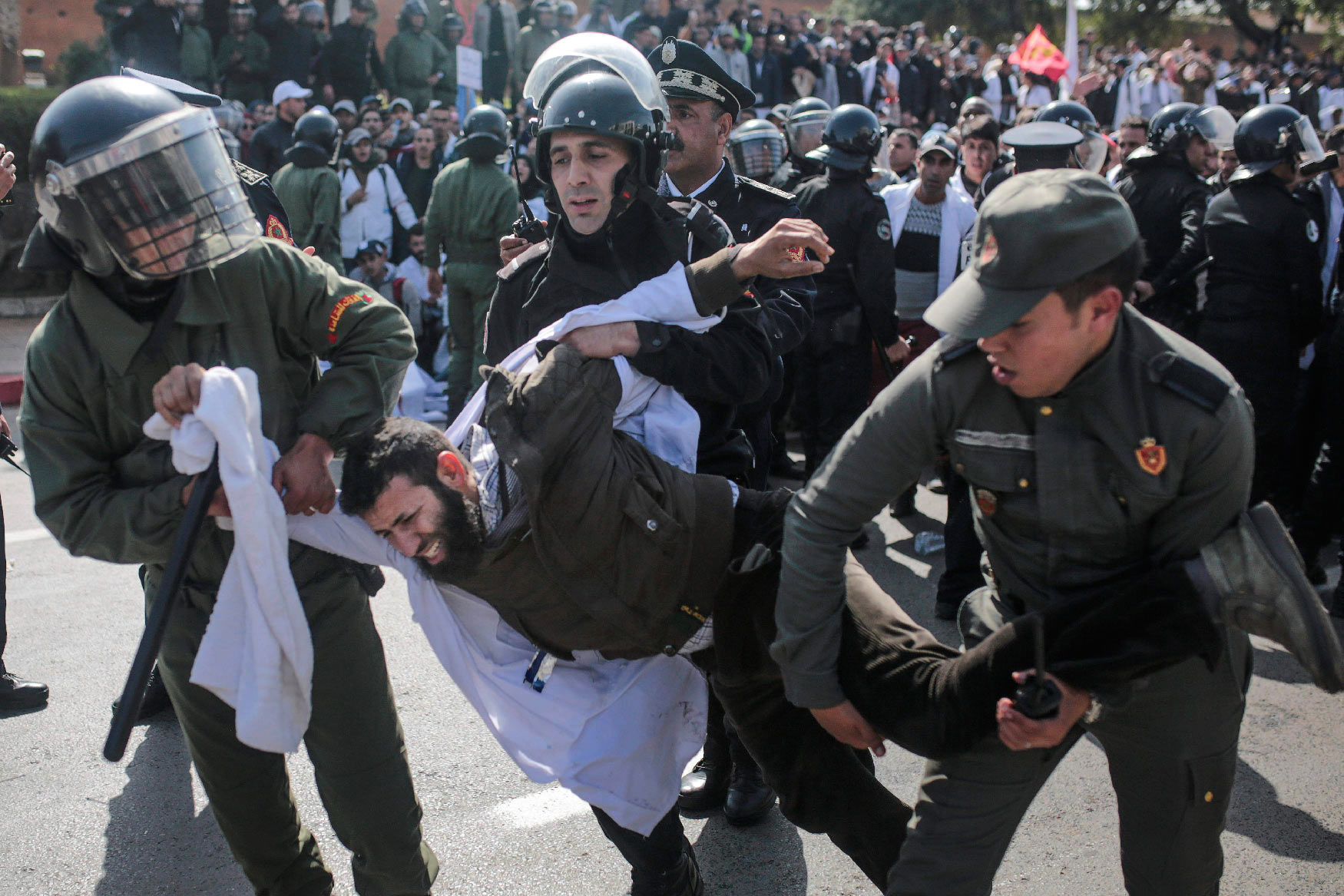Tunisia revolution victims plea for recognition

Some lost a leg, some gaze out from permanently scarred faces, others live forever bound to a wheelchair. All these men were injured in Tunisia’s democratic uprising 10 years ago, and they are begging the government to recognize them as official victims of the revolution.
As Tunisia this week marks the 10th anniversary of the revolt that unleashed the Arab Spring, those injured in the tumult feel disappointed and marginalized.
Since mid-December, they have been holding a sit-in at the office of the Agency for the Revolutionary Martyrs and Wounded, demanding recognition. They voice their demands through megaphones, sit and share stories, or rest on mattresses on the floor.
Some have even tried to set themselves on fire, to emulate the street vendor whose self-immolation in desperation over poverty and police abuse sparked Tunisia’s revolt.
Walid Kasraoui, 32, a protester who lost a leg after getting shot during Tunisia's democratic uprising 10 years ago, poses for a portrait in Tunis, Tunisia, Jan. 12, 2021. (AP Photo/Mosa'ab Elshamy)
Muslim Gasdallah, 31, a protester who lost a leg after getting shot during Tunisia's democratic uprising 10 years ago poses for a portrait in Tunis, Tunisia, Jan. 12, 2021. (AP Photo/Mosa'ab Elshamy)
Khaled Benneejma, 32, a protester who was paralyzed after being shot during Tunisia's democratic uprising 10 years ago, poses for a portrait in Tunis, Tunisia, Jan. 12, 2021. (AP Photo/Mosa'ab Elshamy)
Rached El Arbi, now 30, has been paralyzed since being shot while protesting the autocratic regime of Tunisian President Zine El Abidine Ben Ali, who was overthrown on Jan. 14, 2011. A photo of him hospitalized at the time went viral across the Arab world.
But now, instead of El Arbi supporting his family, they’re now supporting him. El Arbi was 20 when he was shot in the neck during a protest and had to undergo three complex operations. He said he was in a coma for four months before he started to recover.
His family wasn’t prepared for the huge medical costs. His mother said she has three other children, and for a year, “they had to be hungry, so Rachad could eat.”
The mother of Rached El Arbi, a protester who was paralyzed after being shot during Tunisia's democratic uprising 10 years ago, holds a portrait of her son, in Tunis, Tunisia, Jan. 12, 2021. (AP Photo/Mosa'ab Elshamy)
The mother of Rached El Arbi, a protester who was paralyzed after being shot during Tunisia's democratic uprising 10 years ago, holds a photo of her son on a mobile phone, in Tunis, Tunisia, Jan. 12, 2021. Rached El Arbi, now 30, has been paralyzed since being shot while protesting the autocratic regime of Tunisia's President Zine El Abidine Ben Ali, who was overthrown on Jan. 14, 2011. A photo of El Arbi hospitalized at the time went viral across the Arab world. (AP Photo/Mosa'ab Elshamy)
Protester Hosni Kalaia set himself on fire during the uprising. Now 49, he lives with permanent scars on his face and missing fingers. His brother self-immolated in 2015 and died.
Walid Kasraoui lost a leg and has relied on crutches for a decade, but says he has no regrets.
“If I went back in time to the events of the revolution, I would participate again,” he says.
Wael Karrafi, 30, a protester who lost a leg after getting shot during Tunisia's democratic uprising 10 years ago poses for a portrait in Tunis, Tunisia, Tuesday, Jan. 12, 2021. (AP Photo/Mosa'ab Elshamy)
Families have pushed for years for official recognition of those who lost lives or limbs fighting for democracy, and for government financial support. An unofficial list released by the martyrs’ agency counts 129 people killed and 634 injured.
They hope for an official government list to be published on Thursday, the anniversary of the revolution, to guarantee the rights of victims. The government has long promised to formalize such a list after it verifies each case, but efforts have stalled amid other pressing problems.
Kasraoui is running out of patience and says he plans to seek asylum abroad if this list is not published in the next two days.
People who were injured during Tunisia's democratic uprising 10 years ago, stage a protest demanding official recognition, in Tunis, Tunisia, Tuesday, Jan. 12, 2021. Banner in Arabic read "We won't celebrate, the uprising continues". (AP Photo/Mosa'ab Elshamy)
Rached El Arbi, 30, a protester who was paralyzed after being shot during Tunisia's democratic uprising 10 years ago, poses for a portrait while holding an image of himself, in Tunis, Tunisia, Jan. 12, 2021. (AP Photo/Mosa'ab Elshamy)
People who were injured during Tunisia's democratic uprising 10 years ago stage a protest demanding official recognition, in Tunis, Tunisia, Tuesday, Jan. 12, 2021. (AP Photo/Mosa'ab Elshamy)





